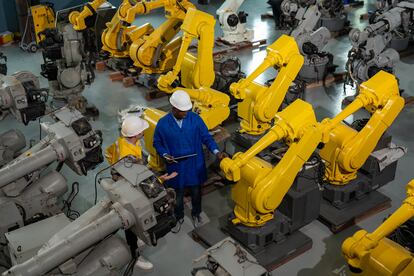Technological progress needs direction, not just speed
A key lesson was learned in the first industrial revolution: technology by itself does not guarantee social improvement unless it focuses on the progress of the majority

You may have heard the fable about the future of factories, where only one dog and one person are working. The human is there to feed the dog, and the dog is there to make sure the human does not bother the robots. And in such a future, which might seem like science fiction, many questions arise: What will the workers who used to manufacture products do now? How will they pay their rent in a market where their job no longer has a place? Will they be able to switch to one of these professions with a “future”? At what point in time will they reinvent themselves professionally? How will being replaced by machines affect their mental health? We should challenge the essence of the technological progress we are advocating while we wait for the answers to these questions.
Every technological leap reignites the debate on labor automation. Some downplay discussions about the impact of artificial intelligence, comparing them to those that emerged with the introduction of looms, assembly lines or computers. This simplification pushes the debate towards emotion. There are the optimists, who regard technology as a synonym for progress, and the pessimists, who are concerned about the loss of quality in jobs and the rise in unemployment.
The fear of not being able to keep pace with technological change has been a recurring theme in the discourse of economists since the time of the first industrial revolution. Figures such as Keynes and Ricardo predicted mass unemployment, but reality proved them wrong. This automation allowed time for the creation of new jobs, especially during the second industrial revolution. Productivity increased, which led to the creation of new occupations and a general growth in economic activity. New sectors and related industries emerged, offering work to those job profiles that had been displaced, often requiring minimal updating of their skills.
A key lesson was learned in the first industrial revolution: technology by itself does not guarantee social improvement unless it focuses on the progress of the majority There was considerable suffering until workers’ struggles and advances in the proto-welfare states led to the sharing of profits between workers and employers.
Jump forward to the beginning of the 2010s. In the wake of the financial crisis, an era of technological boom began, with major breakthroughs in artificial intelligence. Google created a neural network capable of recognizing videos of cats without knowing what a cat is. Oxford academics estimate that 47% of jobs are at risk from advances in machine learning, and argue that tasks requiring creativity, social intelligence and non-repetitive manual labor will be safe. Journalists, lawyers and architects are expected to remain unaffected. In politics, the subject is treated with a certain indifference, with mantras being repeated that, as in previous revolutions, technology brings job creation and progress.
However, since the 1980s, labor has increasingly declined as a share of national income in developed economies. This drop has been attributed to a number of factors, including technology, globalization and the shift toward more intangible capital. Technology in particular has led to the replacement of numerous middle-skill worker functions, resulting in a more pronounced division between high-skill and low-skill jobs. The effects of stagnation have had a devastating effect on the working class, something that economists Angus Deaton – Nobel Prize in economics in 2015 – and Anne Case have termed “deaths of despair.” Their conclusion is unequivocal: without a course that benefits everyone, technology ensures inequality.
When I published my first book a couple of years ago under the title ¿Te va a sustituir un algoritmo? (Will an Algorithm Replace You?), I pointed out that the office was going to be the next destination for automation and, therefore, it would affect economies like ours in Spain. It proposed a toolkit for policymakers who wanted to address the social change we were poised to experience, a change that would transcend the tasks we perform, and impact our identity by altering the system itself.
ChatGPT did not exist then, and all the forums were saying that the work of the future was to write code or to become a graphic designer. With the explosion of artificial intelligence capable of generating code, images and text we now have confirmation that there are no secure jobs. There are currently some 200 million people using an application, ChatGPT, whose website receives 1.7 billion visits every month. The adoption of this technology is unstoppable because it is versatile, easy to use and does not require major investments. Goldman Sachs estimates that some 300 million jobs will be at risk from this technology in Europe and the U.S, while the International Monetary Fund warns that 60% of jobs in developed economies will be affected. 80% of women’s work is exposed. They may all be wrong, but it seems unlikely.
The World Economic Forum predicts a net job loss of 2%, the equivalent of 14 million positions, and the International Labor Organization adds that the challenge is to understand how professions will evolve as a result of this technological advance. Some 281 million people remain in a gray, unknown area, whose future will depend on how the change is implemented; whether artificial intelligence is used to enhance their capabilities or to replace them will depend on political and business decisions.
Many companies have a clear idea. IBM has estimated that 30% of its employees could be replaced by technology. So who will speak up for the workers? We must urge politics not to remain indifferent when faced with a disruption of this magnitude, and to ensure that this productive breakthrough is for everyone’s benefit. We must not simply treat it as a re-skilling process because it is a much more complex issue that affects our lives, our system and our society.
This time the direct effects of technological change on employment will be felt because there is increased adoption and productivity growth is already being recorded. For this to translate into progress, the profits must be shared with those who generate them. We are at a turning point in economic reconfiguration across the labor market. Expecting that, in a time-strapped society, the exhausted working class will find a way to reinvent itself and benefit from it is only an aspiration of those who know they have such a luxury.
Sign up for our weekly newsletter to get more English-language news coverage from EL PAÍS USA Edition
Tu suscripción se está usando en otro dispositivo
¿Quieres añadir otro usuario a tu suscripción?
Si continúas leyendo en este dispositivo, no se podrá leer en el otro.
FlechaTu suscripción se está usando en otro dispositivo y solo puedes acceder a EL PAÍS desde un dispositivo a la vez.
Si quieres compartir tu cuenta, cambia tu suscripción a la modalidad Premium, así podrás añadir otro usuario. Cada uno accederá con su propia cuenta de email, lo que os permitirá personalizar vuestra experiencia en EL PAÍS.
¿Tienes una suscripción de empresa? Accede aquí para contratar más cuentas.
En el caso de no saber quién está usando tu cuenta, te recomendamos cambiar tu contraseña aquí.
Si decides continuar compartiendo tu cuenta, este mensaje se mostrará en tu dispositivo y en el de la otra persona que está usando tu cuenta de forma indefinida, afectando a tu experiencia de lectura. Puedes consultar aquí los términos y condiciones de la suscripción digital.









































